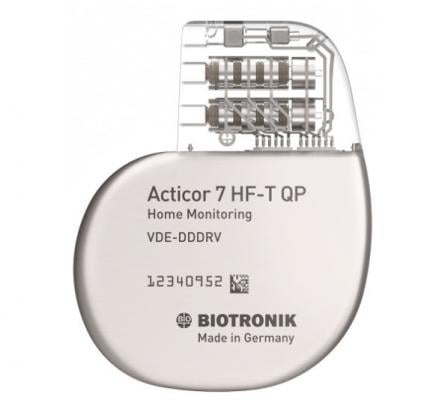
BIO-AffectDX is a multi-center, observational study that will enroll HF patients with paroxysmal, persistent and long-standing persistent AF, and a standard CRT-D indication. The study will include up to 400 participants implanted with a Biotronik Acticor CRT-DX system.
August 3, 2021 — In association with Heart Rhythm 2021, Biotronik announced first enrollments in the landmark BIO-AffectDX trial, designed to evaluate clinical outcomes of cardiac resynchronization therapy (CRT) in patients with heart failure (HF) and atrial fibrillation (AF).
BIO-AffectDX is a multi-center, observational study that will enroll HF patients with paroxysmal, persistent and long-standing persistent AF, and a standard CRT-D indication according to current guidelines. The study will include up to 400 participants, at up to 50 U.S. sites, implanted with a Biotronik Acticor CRT-DX system (CRT-DX pulse generator and a DX ICD lead) and any commercially available left ventricular (LV) lead.
HF and AF frequently coexist and the concomitant presence of both puts a patient at increased risk for mortality1. Early clinical trials evaluating the effectiveness of CRT technology excluded patients with AF, leading to limited data to establish a benefit and guidelines for using the technology in this population2,3.
Earlier research identified evidence gaps related to the effectiveness of CRT among patients with paroxysmal, persistent and permanent AF, along with the role of atrioventricular (AV) node ablation2. This led to a consensus among the BIO-AffectDX steering committee that additional data on outcomes using CRT-D therapy is needed in a contemporary US population of patients with AF.
"The current data do not offer us a complete picture of the effectiveness of CRT, particularly in regards to our AF patients," said Jonathan Dukes, M.D., Director of Cardiac Electrophysiology at Community Memorial Hospital, Ventura California, who enrolled the first patient in the trial. "Our current CRT practice strategies for this unique population have been predominately based on expert opinion, and additional outcome data are needed to clarify the optional approach to CRT and heart failure management in our AF patients."
Study endpoints:
The primary endpoint will evaluate the rate of subjects showing improvement from baseline using a Clinical Composite Score (CCS) at 12 months.
The trial will assess conversion to sinus rhythm at any time during the 12-month follow-up period to determine long-term benefits of CRT in this population.
"The BIO-AffectDX trial will gather information about atrial activity with a two lead CRT system," said Alexandru Costea, M.D., director, Center for Electrophysiology, University of Cincinnati. "Not only the procedure time goes down but also the potential for complications is reduced dramatically."
BIOTRONIK has engaged a steering committee to review the design and the protocol for the Bio-AffectDX study:
• Alexandru Costea, M.D., Professor of Medicine, Director, Center for Electrophysiology, Rhythm Disorders and Electro-Mechanical Interventions, University of Cincinnati
• Aaron Hesselson, M.D., Director of Electrophysiologic Services, University of Kentucky
• Jonathan Hsu, M.D., Cardiac Electrophysiology, Associate Professor of Medicine, University of California
• Jackson Liang, M.D., Clinical Assistant Professor, University of Michigan
• Stavros Mountantonakis, M.D., Cardiac Electrophysiology, Lenox Hill Hospital/Northwell Health
For more information: www.biotronik.com/en-us
Find additional HRS 2021 late breaking trials
Find more HRS 2021 conference news
References:


 December 19, 2025
December 19, 2025 









